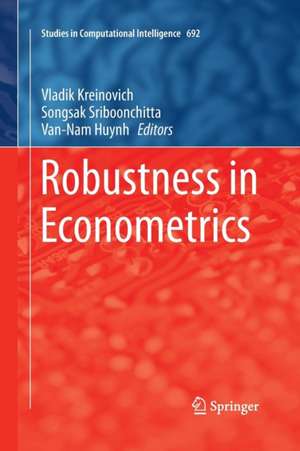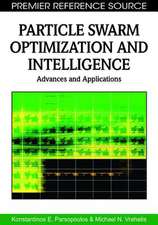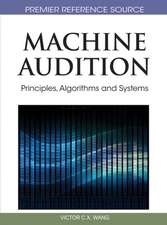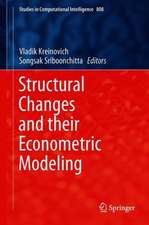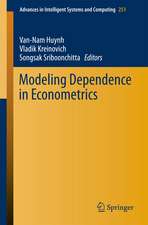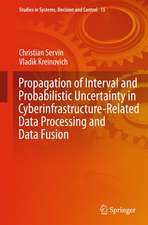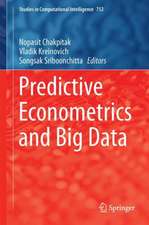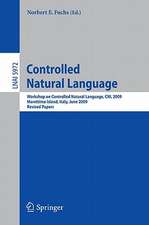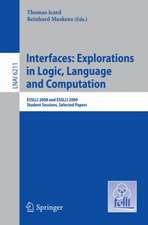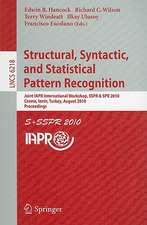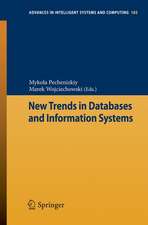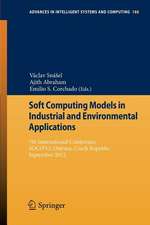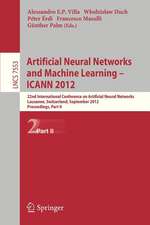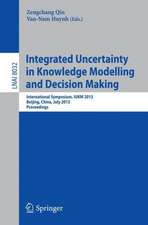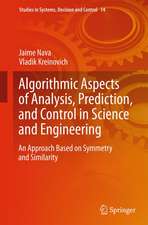Robustness in Econometrics: Studies in Computational Intelligence, cartea 692
Editat de Vladik Kreinovich, Songsak Sriboonchitta, Van-Nam Huynhen Limba Engleză Paperback – 13 iul 2018
This book presents recent research on robustness in econometrics. Robust data processing techniques – i.e., techniques that yield results minimally affected by outliers – and their applications to real-life economic and financial situations are the main focus of this book. The book also discusses applications of more traditional statistical techniques to econometric problems.
Econometrics is a branch of economics that uses mathematical (especially statistical) methods to analyze economic systems, to forecast economic and financial dynamics, and to develop strategies for achieving desirable economic performance. In day-by-day data, we often encounter outliers that do not reflect the long-term economic trends, e.g., unexpected and abrupt fluctuations. As such, it is important to develop robust data processing techniques that can accommodate these fluctuations.
| Toate formatele și edițiile | Preț | Express |
|---|---|---|
| Paperback (1) | 1178.37 lei 6-8 săpt. | |
| Springer International Publishing – 13 iul 2018 | 1178.37 lei 6-8 săpt. | |
| Hardback (1) | 1185.14 lei 6-8 săpt. | |
| Springer International Publishing – 20 feb 2017 | 1185.14 lei 6-8 săpt. |
Din seria Studies in Computational Intelligence
- 20%
 Preț: 449.37 lei
Preț: 449.37 lei - 20%
 Preț: 1158.26 lei
Preț: 1158.26 lei - 20%
 Preț: 986.66 lei
Preț: 986.66 lei - 20%
 Preț: 1452.76 lei
Preț: 1452.76 lei - 20%
 Preț: 168.78 lei
Preț: 168.78 lei - 20%
 Preț: 1291.10 lei
Preț: 1291.10 lei - 18%
 Preț: 1112.30 lei
Preț: 1112.30 lei - 20%
 Preț: 565.39 lei
Preț: 565.39 lei - 20%
 Preț: 649.28 lei
Preț: 649.28 lei - 20%
 Preț: 1047.73 lei
Preț: 1047.73 lei - 20%
 Preț: 1578.96 lei
Preț: 1578.96 lei - 20%
 Preț: 643.50 lei
Preț: 643.50 lei - 20%
 Preț: 657.49 lei
Preț: 657.49 lei - 20%
 Preț: 993.28 lei
Preț: 993.28 lei - 20%
 Preț: 990.80 lei
Preț: 990.80 lei - 20%
 Preț: 989.96 lei
Preț: 989.96 lei - 20%
 Preț: 1165.69 lei
Preț: 1165.69 lei - 20%
 Preț: 1444.52 lei
Preț: 1444.52 lei - 20%
 Preț: 1041.96 lei
Preț: 1041.96 lei - 20%
 Preț: 1047.73 lei
Preț: 1047.73 lei - 20%
 Preț: 1046.06 lei
Preț: 1046.06 lei - 18%
 Preț: 2500.50 lei
Preț: 2500.50 lei - 20%
 Preț: 989.13 lei
Preț: 989.13 lei - 20%
 Preț: 1165.69 lei
Preț: 1165.69 lei - 20%
 Preț: 1164.05 lei
Preț: 1164.05 lei - 20%
 Preț: 1042.79 lei
Preț: 1042.79 lei - 20%
 Preț: 1460.19 lei
Preț: 1460.19 lei - 18%
 Preț: 1403.52 lei
Preț: 1403.52 lei - 18%
 Preț: 1124.92 lei
Preț: 1124.92 lei - 20%
 Preț: 1039.47 lei
Preț: 1039.47 lei - 20%
 Preț: 1008.11 lei
Preț: 1008.11 lei - 20%
 Preț: 1045.25 lei
Preț: 1045.25 lei - 20%
 Preț: 1275.42 lei
Preț: 1275.42 lei - 20%
 Preț: 1040.32 lei
Preț: 1040.32 lei - 20%
 Preț: 988.32 lei
Preț: 988.32 lei - 20%
 Preț: 1169.79 lei
Preț: 1169.79 lei - 20%
 Preț: 1162.37 lei
Preț: 1162.37 lei - 20%
 Preț: 1059.26 lei
Preț: 1059.26 lei - 20%
 Preț: 1164.05 lei
Preț: 1164.05 lei - 20%
 Preț: 1166.52 lei
Preț: 1166.52 lei - 20%
 Preț: 1459.38 lei
Preț: 1459.38 lei - 18%
 Preț: 1005.74 lei
Preț: 1005.74 lei - 20%
 Preț: 997.38 lei
Preț: 997.38 lei - 20%
 Preț: 1055.94 lei
Preț: 1055.94 lei - 20%
 Preț: 1284.47 lei
Preț: 1284.47 lei - 20%
 Preț: 994.08 lei
Preț: 994.08 lei - 20%
 Preț: 1048.72 lei
Preț: 1048.72 lei - 20%
 Preț: 1066.02 lei
Preț: 1066.02 lei - 20%
 Preț: 943.78 lei
Preț: 943.78 lei - 20%
 Preț: 1173.10 lei
Preț: 1173.10 lei
Preț: 1178.37 lei
Preț vechi: 1472.96 lei
-20% Nou
Puncte Express: 1768
Preț estimativ în valută:
225.55€ • 245.08$ • 189.59£
225.55€ • 245.08$ • 189.59£
Carte tipărită la comandă
Livrare economică 21 aprilie-05 mai
Preluare comenzi: 021 569.72.76
Specificații
ISBN-13: 9783319844800
ISBN-10: 3319844806
Ilustrații: X, 705 p. 129 illus., 120 illus. in color.
Dimensiuni: 155 x 235 mm
Greutate: 0.98 kg
Ediția:Softcover reprint of the original 1st ed. 2017
Editura: Springer International Publishing
Colecția Springer
Seria Studies in Computational Intelligence
Locul publicării:Cham, Switzerland
ISBN-10: 3319844806
Ilustrații: X, 705 p. 129 illus., 120 illus. in color.
Dimensiuni: 155 x 235 mm
Greutate: 0.98 kg
Ediția:Softcover reprint of the original 1st ed. 2017
Editura: Springer International Publishing
Colecția Springer
Seria Studies in Computational Intelligence
Locul publicării:Cham, Switzerland
Cuprins
Part I Keynote Addresses: Robust Estimation of Heckman Model.- Part II Fundamental Theory: Sequential Monte Carlo Sampling for State Space Models.- Robustness as a Criterion for Selecting a Probability Distribution Under Uncertainty.- Why Cannot We Have a Strongly Consistent Family of Skew Normal (and Higher Order) Distributions.- Econometric Models of Probabilistic Choice: Beyond McFadden’s Formulas.- How to Explain Ubiquity of Constant Elasticity of Substitution (CES) Production and Utility Functions Without Explicitly Postulating CES.- How to Make Plausibility-Based Forecasting More Accurate.- Structural Breaks of CAPM-type Market Model with Heteroskedasticity and Quantile Regression.- Weighted Least Squares and Adaptive Least Squares: Further Empirical Evidence.- Prior-free probabilistic inference for econometricians.- Robustness in Forecasting Future Liabilities in Insurance.- On Conditioning in Multidimensional Probabilistic Models.- New EstimationMethod for Mixture of Normal Distributions.- EM Estimation for Multivariate Skew Slash Distribution.- Constructions of multivariate copulas.- Plausibility regions on the skewness parameter of skew normal distributions based on inferential models.- International Yield Curve Prediction with Common Functional Principal Component Analysis.- An alternative to p-values in hypothesis testing with applications in model selection of stock price data.- Confidence Intervals for the Common Mean of Several Normal Populations.- A generalized information theoretical approach to Non-linear time series model.- Predictive recursion maximum likelihood of Threshold Autoregressive model.- A multivariate generalized FGM copulas and its application to multiple regression.- Part III Applications: Key Economic Sectors and Their Transitions: Analysis of World Input-Output Network.- Natural Resources, Financial Development and Sectoral Value Added in a Resource Based Economy.- Can bagging improve the forecasting performance of tourism demand models?.- The Role of Asian Credit Default Swap Index in Portfolio Risk Management.- Chinese outbound tourism demand to Singapore, Malaysia and Thailand destinations: A study of political events and holiday impacts.- Forecasting Asian Credit Default Swap spreads: A comparison of multi-regime models.- Forecasting Asian Credit Default Swap spreads: A comparison of multi-regime models.- Effect of Helmet Use on Severity of Head Injuries Using Doubly Robust Estimators.- Forecasting cash holding with cash deposit using time series approaches.- Forecasting GDP Growth in Thailand with Different Leading Indicators using MIDAS regression models.- Testing the Validity of Economic Growth Theories Using Copula-based Seemingly Unrelated Quantile Kink Regression.- Analysis of Global Competitiveness Using Copula-based Stochastic Frontier Kink Model.- Gravity model of trade with Linear Quantile Mixed Models approach.- Stochastic Frontier Model in Financial Econometrics:A Copula-based Approach.- Quantile Forecasting of PM10 Data in Korea based on Time Series Models.- Do We Have Robust GARCH Models under Different Mean Equations: Evidence from Exchange Rates of Thailand?.- Joint Determinants of Foreign Direct Investment (FDI) Inflow in Cambodia: A Panel Co-integration Approach.- The Visitors’ Attitudes and Perceived Value toward Rural Regeneration Community Development of Taiwan.- Analyzing the contribution of ASEAN stock markets to systemic risk.- Estimating Efficiency of Stock Return with Interval Data.- The impact of extreme events on portfolio in financial risk management.- Foreign Direct Investment, Exports and Economic Growth in ASEAN Region: Empirical Analysis from Panel Data.- Author Index
Textul de pe ultima copertă
This book presents recent research on robustness in econometrics. Robust data processing techniques – i.e., techniques that yield results minimally affected by outliers – and their applications to real-life economic and financial situations are the main focus of this book. The book also discusses applications of more traditional statistical techniques to econometric problems.
Econometrics is a branch of economics that uses mathematical (especially statistical) methods to analyze economic systems, to forecast economic and financial dynamics, and to develop strategies for achieving desirable economic performance. In day-by-day data, we often encounter outliers that do not reflect the long-term economic trends, e.g., unexpected and abrupt fluctuations. As such, it is important to develop robust data processing techniques that can accommodate these fluctuations.
Caracteristici
Presents recent research on robustness in econometrics Introduces theoretical foundations and applications Written by respected experts in the field Includes supplementary material: sn.pub/extras
